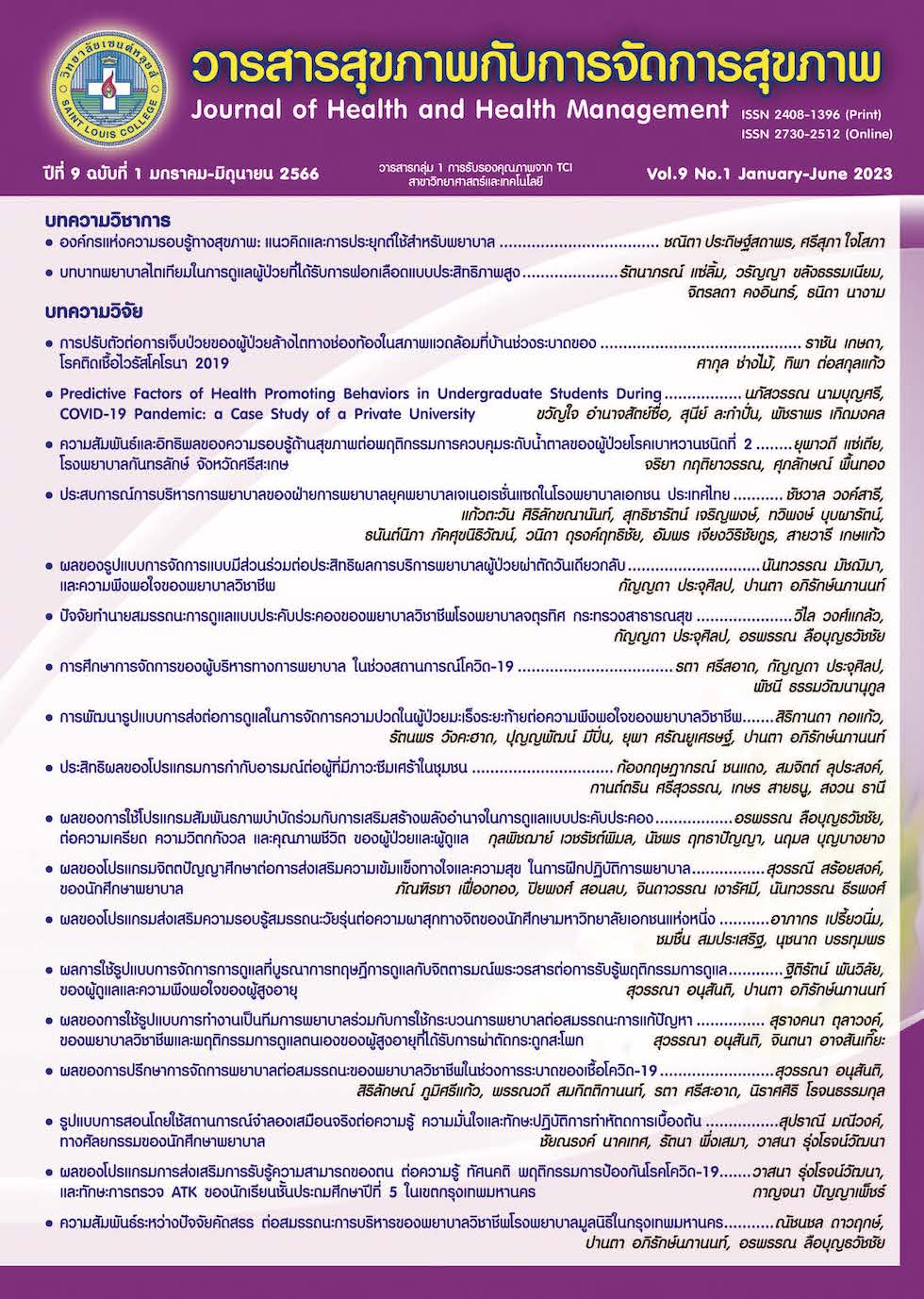Experience of Nursing Administration of Nursing Department toward Generation Z Nurses at Private Hospitals in Thailand
Keywords:
Nursing Administration, Nursing Department at Private Hospitals, Generation Z NursesAbstract
This descriptive qualitative research aimed to describe experience of nursing administration of nursing department toward generation Z nurses of large private hospitals. The study used Edmund Husserl phenomenology approach. The participant 24 key informants is director of nursing or deputy, first-line nurse managers and head of human resource management. Recruited by purposing sampling, data were collected through in-depth interviews, observations, and tape record. Clolaizzi approached and Atlas ti 6.1 program for content analysis was used to analyze data in this study. Experience of nursing administration of nursing department toward generation Z nurses. There are consists of categorized into 6 major themes : 1) Recruiting staff nurses, funding selected nursing learners and recruited those with mildest personality. 2) Relationships created by organizing activities with other departments and providing part-time work in different nursing departments. 3) Retention nurses on task by creating a career path for growth, provide fair compensation and care of good welfare. 4) Renovation works culture, emphasize reasoning and empirical evidence rather than the senior system. Fostering innovation and diverse cultures in the work system. 5) Reconciliation and aspiration created, focus on effective conflict management, motivate them to work with appreciation, reward and develop expertise to match the task., and 6) Resource management, manage resources to be more cost-effective by promoting awareness of ownership. Nursing departments and head nurses should all research findings apply principle in nursing management, for good benefit of generation Z nurses and generation’s diversity in work systems.
References
ชัชวาล วงค์สารี. (2558). การสอนบนคลินิกในรายวิชาการปฏิบัติการพยาบาลผู้ใหญ่สำหรับนิสิต Generation Z. วารสารวิทยาลัยพยาบาลบรมราชชนนี กรุงเทพ, 31(2), 130-140.
ชัชวาล วงค์สารี, และแก้วตะวัน ศิริลักขณานันท์. (2562). การออกแบบการเรียนการสอนในยุคศตวรรษ 21 และการสร้างแบบสอบสัมฤทธิผลวิชาทฤษฏีในสาขาวิชาพยาบาลศาสตร์. วารสารสุขภาพกับการจัดการสุขภาพ, 5(2), 1-22.
ชัชวาล วงค์สารี, ศุภลักษณ์ พื้นทอง, และสุทธิชารัตน์ จันติยะ. (2563). ประสบการณ์การทำงานของพยาบาลวิชาชีพเจเนอเรชั่นแซดที่ทำงานไม่ตรงกับแผนกที่ตนเลือกสรร. วารสารพยาบาลทหารบก, 21(1), 136-146.
ชัชวาล วงค์สารี. (2564). โมเดลความสัมพันธ์ระหว่างสิ่งแวดล้อมที่สนับสนุน ความรู้ ทักษะและความสามารถ คุณลักษณะบุคลิกภาพและการพัฒนาความพร้อมในการทำงานต่อการริเริ่มด้วยตนเองของหัวหน้าหอผู้ป่วยในโรงพยาบาลเอกชน (วิทยานิพนธ์ปริญญาดุษฏีบัณฑิต) มหาวิทยาลัยคริสเตียน, นครปฐม.
ชลิตพันธ์ บุญมีสุวรรณ. (2563). ความผูกพันของพนักงานต่อองค์การ : แนวทางสู่ความสำเร็จ. วารสารธุรกิจปริทัศน์, 12(1), 197-207.
นวรัตน์ ไวชมพู, อัจฉรา มุสิกวัณณ์, และสุนีย์ เครานวล. (2562). ความสามารถในการบริหารเวลาของนักศึกษาพยาบาลวิทยาลัยพยาบาลบรมราชชนนี ยะลา. วารสารวิชาการมหาวิทยาลัยอีสเทิร์นเอเชีย ฉบับสังคมศาสตร์และมนุษยศาสตร์, 9(1), 296-306
นิสา ทมาภิรัต, และอารีย์วรรณ อ่วมตานี. (2560). การเป็นพยาบาลจบใหม่ที่ปฏิบัติงานภายใต้การดูแลของพยาบาลพี่เลี้ยง. วารสารพยาบาลทหารบก, 18(ฉบับเสริม), 32-40.
Barhate, B., & Dirani, K. M. (2022). Career aspirations of generation Z: a systematic literature review. European Journal of Training and Development, 46(1/2), 139-157.
Chicca, J., & Shellenbarger, T. (2018). Connecting with Generation Z: Approaches in nursing education. Teaching and Learning in Nursing, 13(3), 180-184.
Chicca, J., & Shellenbarger, T. (2019). A new generation of nurses is here: Strategies for working with Generation Z. American Nurse Today, 14(2), 48-51.
Colaizzi P.(1978).Psychological research as the Phenomenologist views it.In Existential Phenomenological Alternatives for Psychology. London: Oxford University Press.
Denzin, N. (2009). Strategies of multiple triangulation. New York: Routledge.
Shatto, B., & Erwin, K. (2016). Moving on from millennials: Preparing for generation Z. The Journal of Continuing Education in Nursing, 47(6), 253-254.
Snow, E. L., Jackson, G. T., & McNamara, D. S. (2014). Emergent behaviors in computer-based learning environments: Computational signals of catching up. Computers in Human Behavior, 41(2014), 62-70.
Downloads
Published
How to Cite
Issue
Section
License
Copyright (c) 2023 Journal of health and health management

This work is licensed under a Creative Commons Attribution-NonCommercial-NoDerivatives 4.0 International License.




